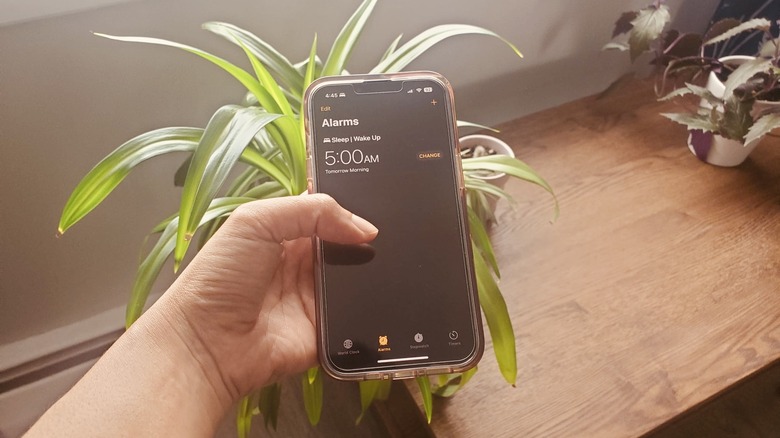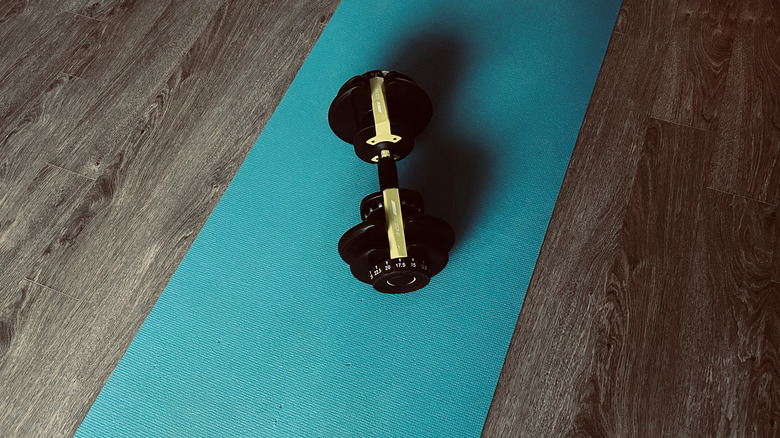We Tried 'The 5 AM Club' Morning Routine For A Week. Here's How It Went.
We may receive a commission on purchases made from links.
Let's just put this out there — I've never been a fan of waking up early in the morning. Getting up for school almost always meant I was the last to drag myself out of bed (my sister beat me to it every time) and I'm grateful I have a job working from home that doesn't require me to commute for an hour (and therefore wake up early).
I was intrigued, nonetheless, by the number of people claiming transformation after practicing a simple principle from Canadian writer and leadership expert Robin Sharma's book, "The 5AM Club: Own Your Morning. Elevate Your Life". What's the principle, you ask? Wake up at 5 a.m. for starters, and divide that first hour, which the author calls "the victory hour," into three sections of 20 minutes each — one sliver dedicated to exercise, one for reflection, and the last for learning. The idea is that you stop procrastinating doing the things you want to do in life — like exercise more or learn something new — and grab the bull by the horns, so to speak. It's also about productivity, setting the tone for the rest of your day, and getting some much-needed time to yourself.
With a preconceived notion that this is what healthy people actually do every morning, I set my alarm for 5 a.m. and went to bed. The intention was to try this out for seven days (including the weekend) and see where it got me. Falling asleep, knowing that I have to be up in a few hours, was nerve-racking that first night but the routine fell into place as time went on. Here's what happened.
Waking up early to learn helps with mental clarity
Taking in information on the two courses I'm currently following was far easier (and much more pleasant) at the crack of dawn. My mind wasn't distracted, the quiet certainly helped, and I came away feeling like I'd learned a lot within just 20 minutes. Perhaps this is why people who study in the morning allude that your mind is sharper and more focused in the wee hours. However, experts seem divided on the topic.
Whether you learn best at night or at dawn might depend on your genes and circadian cycle, according to some science. More specifically, your chronotype might dictate whether you're a night owl or a lark. Proponents of late-night studying say that ingesting information before bed and giving yourself time to rest shortly thereafter can help the information stick better. In fact, a 2012 study published in PLOS ONE looked into exactly that. However, there's also 2019 research published in the journal Sleep that points toward lower resting brain connectivity in night owls. This typically means poorer attention, slower reactions, and increased sleepiness throughout the day.
And then there are others, like sleep doctor Dr. Michael Breus, who recommend that you fit learning something new into the pockets of 10:00 a.m. to 2:00 p.m. and again between 4:00 p.m. and 10:00 p.m. when your brain is in acquisition mode (via Inc.). Perhaps, you are the best judge of habits that are actually hurting your brain and can see what time of day is most effective for you.
Limiting intense exercise to 20 minutes could feel rushed
Exercise, specifically weight training, is a big part of my day and usually comes at the end of work when I have a few hours to kill and don't have to rush through a workout.
"The 5 A.M. Club" morning routine calls for exercise in the first 20 minutes after waking up. I found this impractical because of the logistics of visiting the bathroom, pulling on workout clothes and shoes, and getting a full-body weighted training done in 20 minutes. It's just not possible. Even if you wake up at 4:45 a.m., which the book apparently recommends, rushing past exercises that are meant to be done consciously, mindfully, and carefully isn't the best idea. You risk moving too fast, neglecting posture, and getting injured.
So I decided to try yoga instead. This felt a lot more natural, slow-paced, and enjoyable. It also felt good to wake myself up with the gentle stretching movements yoga necessitates. Yoga stretches to help you wake up every morning are thought to relieve muscle stiffness, reduce stress, and bring focus to your breathing. All of this was true in my case. I felt a lot lighter and more aware of my breathing as I went about my day. It was also a fun way to introduce something other than weight training to my everyday schedule. Perhaps, the goal is to find a type of exercise — whether that's cardio or stretching — that's going to make you feel awake in the morning.
Would we recommend 'The 5 A.M. Club' morning routine?
Despite its limitations, I found "The 5 A.M. Club" morning routine to be a perfect antidote to a usually rushed start to the day. It prevents looking at your phone the first thing in the morning because you're more focused on doing the three things you're supposed to be doing in the first 60 minutes. However, here are a few recommendations I'd make:
- Don't get hung up on the order of "The 5 A.M. Club" morning routine list. If exercising feels like a rude shock to your system as soon as you wake up, keep that item for the last 20 minutes instead. Personally, it felt a lot more natural to do the slower-paced items on the list first and then work myself up to the exercise part.
- "The 5 A.M. Club" routine is an excellent hack for people who are trying to make exercising, reflection, and learning something new a part of their everyday schedule. Even doing it for as little as a week makes it easier to stay consistent with the habit, especially when you start to see the benefits (66 days is the author-recommended time period).
- Try not to get caught up in the exact time slot of 20 minutes per activity (unless of course, there are time constraints). If one activity has piqued your interest, like meditation or pilates, stay in that space for longer and then move on to the rest.
- Don't practice the hack while skimping on your sleep (something the author stresses too).
- Sleep in on the weekends if you want to (again, author-recommended).



